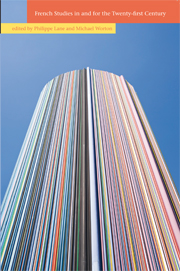Book contents
- Frontmatter
- Contents
- Notes on Contributors
- Foreword by Baroness Jean Coussins
- Foreword by His Excellency Bernard Emié
- Part I Contextualisations
- Part II Research and Public Engagement Strategies
- Part III The Place of Women and Gender in French Studies
- Part IV The Place of Literature
- Part V The Place of Linguistics in French Studies Today
- Part VI Theatre, Cinema and Popular Culture
- Part VII Area Studies, Postcolonial Studies and War and Culture Studies
- Part VIII Adventures in Language Teaching
- 19 French Studies at the Open University: Pointers to the Future
- 20 Opportunities and Challenges of Technologically Enhanced Programmes: Online and Blended Learning at King's College London
- 21 French Studies and Employability at Home and Abroad: General Reflections on a Case Study
- 22 Sartre in Middlesex, De Beauvoir in Oxford: The Contribution of the ASMCF to the Study of France
- 23 Culturetheque: A New Tool for French Culture
- Appendices. Addresses to the Future of French Studies Conference
- Index
19 - French Studies at the Open University: Pointers to the Future
from Part VIII - Adventures in Language Teaching
- Frontmatter
- Contents
- Notes on Contributors
- Foreword by Baroness Jean Coussins
- Foreword by His Excellency Bernard Emié
- Part I Contextualisations
- Part II Research and Public Engagement Strategies
- Part III The Place of Women and Gender in French Studies
- Part IV The Place of Literature
- Part V The Place of Linguistics in French Studies Today
- Part VI Theatre, Cinema and Popular Culture
- Part VII Area Studies, Postcolonial Studies and War and Culture Studies
- Part VIII Adventures in Language Teaching
- 19 French Studies at the Open University: Pointers to the Future
- 20 Opportunities and Challenges of Technologically Enhanced Programmes: Online and Blended Learning at King's College London
- 21 French Studies and Employability at Home and Abroad: General Reflections on a Case Study
- 22 Sartre in Middlesex, De Beauvoir in Oxford: The Contribution of the ASMCF to the Study of France
- 23 Culturetheque: A New Tool for French Culture
- Appendices. Addresses to the Future of French Studies Conference
- Index
Summary
Part-time study is an obvious way for students to carry on earning while learning, keeping costs down and providing alternative routes into education. Part-time students now make up one third of all undergraduates. Giving a fairer deal to part-time students could raise our skills base and improve social mobility while actually saving the Government money. (David Willetts, now Minister for Universities and Science)
At the Open University, French is taught by the largest but least conventional department of languages in the UK. Numbers of language students are now approaching 10,000 a year, which translates into over 3,000 full-time equivalent student (FTEs) numbers. In terms of recruitment, whether actual students or FTEs, the Open University is also the largest French department in the UK. This chapter describes our distinctive and innovative approach to teaching French, and our related research activities. It opens by setting language learning in the context of supported distance education, and concludes by proposing wider interuniversity collaboration in the context of globalising higher education and falling UK interest in degree-level language study.
Principles of Supported Distance Learning at the Open University
By the time the Open University (OU) moved into languages, it had already demonstrated the effectiveness of supported distance learning, and its ability to help large numbers of disparate and geographically scattered students to achieve their educational ambitions. The OU's mission has always been distinctive: being open to people, places, methods and ideas brings challenges unfamiliar to conventional, residential universities.
- Type
- Chapter
- Information
- French Studies in and for the 21st Century , pp. 235 - 246Publisher: Liverpool University PressPrint publication year: 2011
- 1
- Cited by



